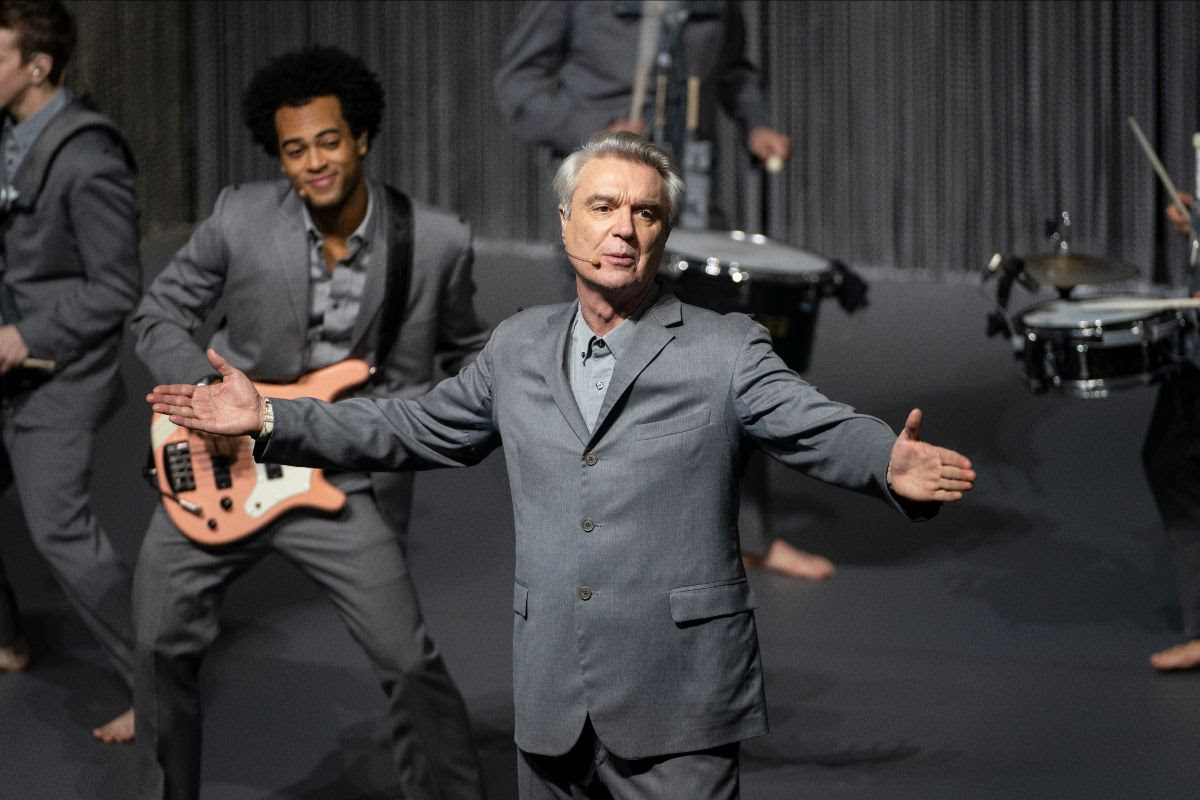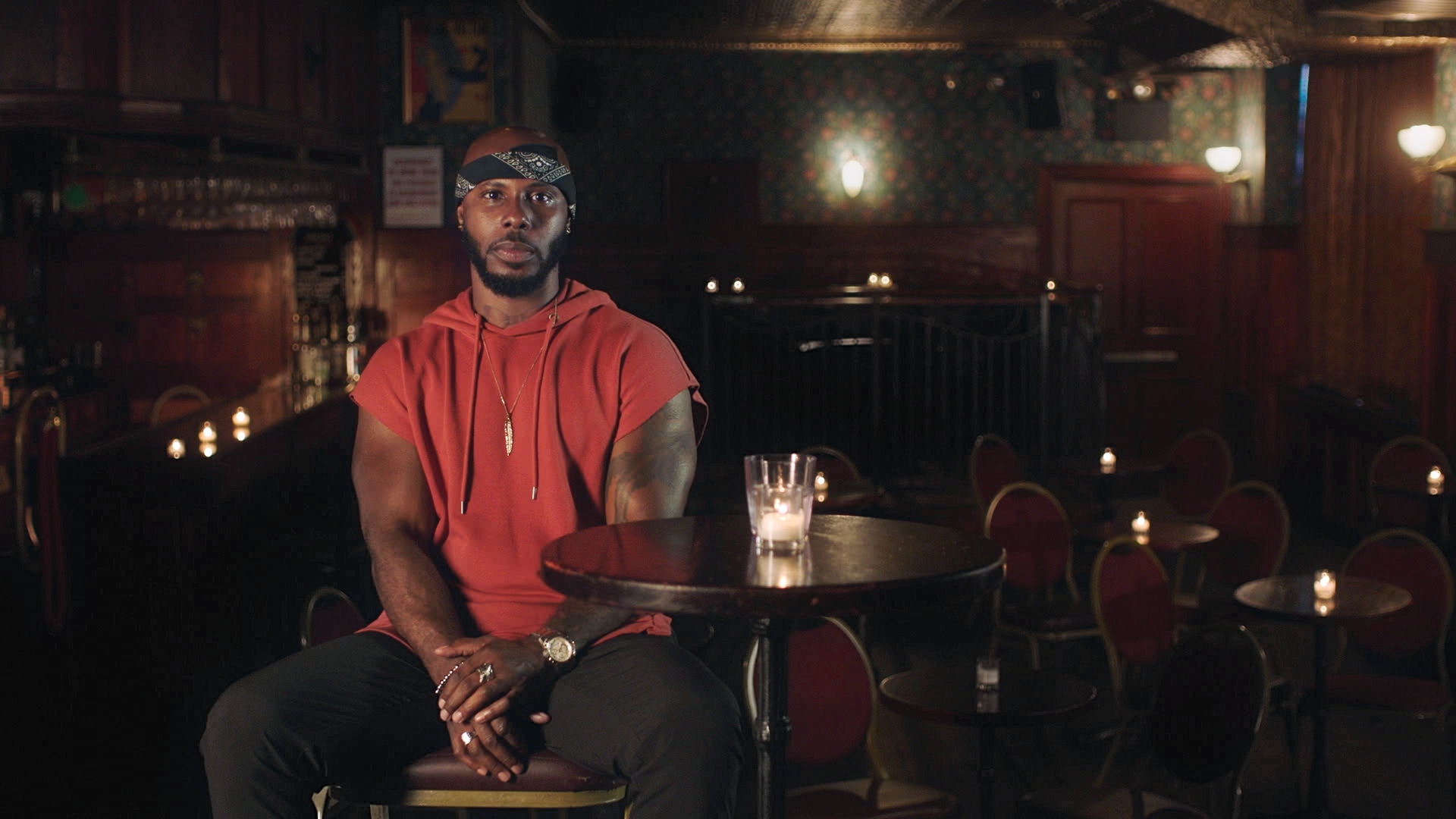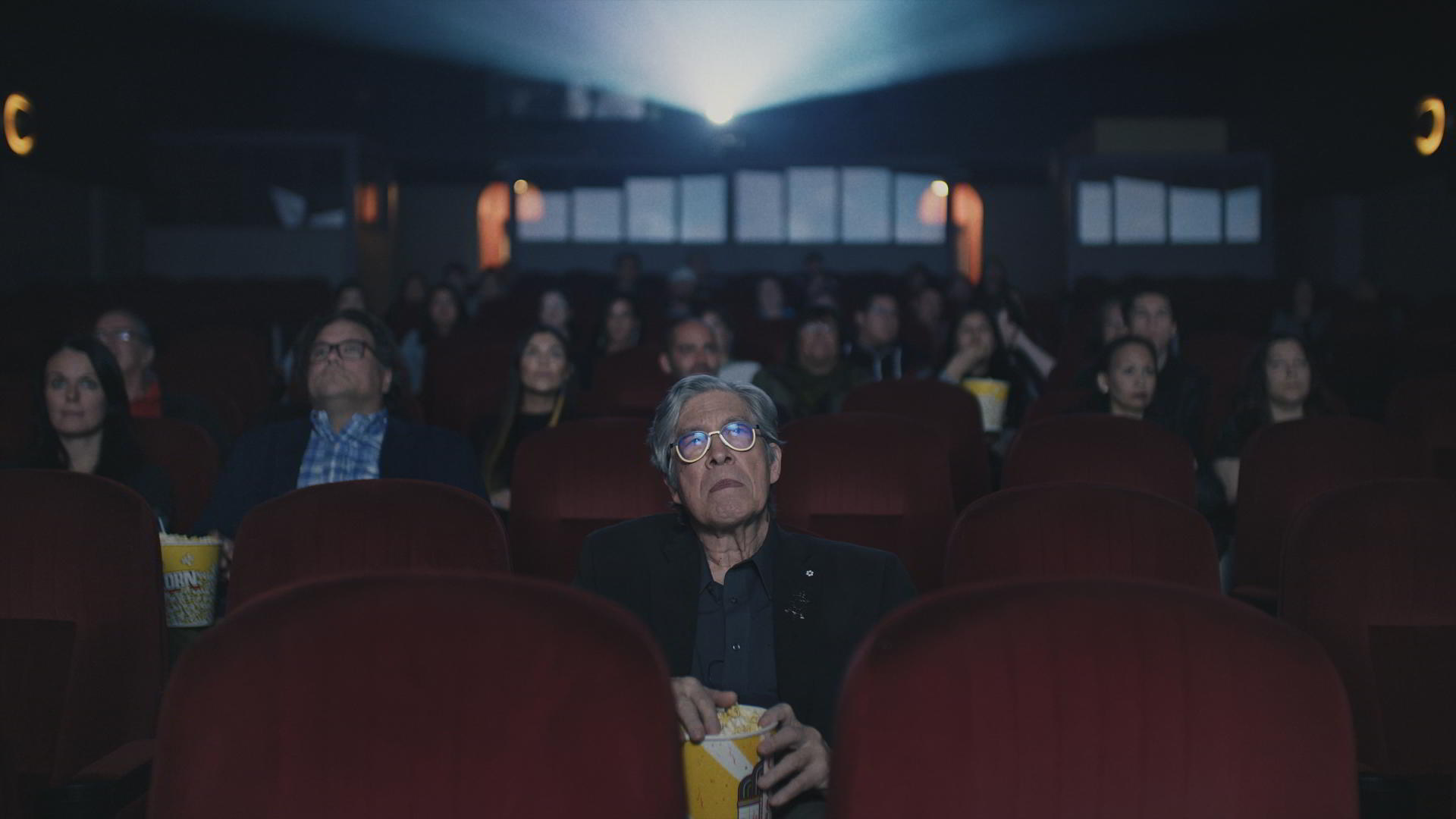David Byrne’s American Utopia
(USA, 105 min.)
Dir. Spike Lee
Programme: Galas
One of the more surreal moments of American Utopia, the concert doc directed by Spike Lee, occurs when David Byrne turns to his onscreen Broadway audience and says, “Thank you for leaving your homes.” Given the virtual nature of this COVD-19 era, this TIFF opening film about togetherness and communal celebration feels like a distant artifact from a lost age.
Ostensibly a straight up documentation of the show that first toured around the world (including a memorable stop in Toronto) before settling in for a residency at the Hudson Theatre on New York’s 44th St., the film places the viewer in the prime spot to take in this remarkable performance. Mixing songs from Byrne’s record that gives the experience its name, as well as classics from his career dating back to his time with the Talking Heads, we are treated to an energizing celebration of harmonies and rhythms drawn from all over the world.
Byrne’s polyglot musical nature is as evident as ever – he helped popularize the “world music” era in the 1980s, and with his Luaka Bop label did much to bring South American artists in particular to the world’s attention – and his band of compatriots is a fine reflection of this global perspective. Dressed in grey suits, dress shirts, and arriving bare-footed, the various instrumentalists are wired in self-contained fashion to allow full movement on stage. The end result is a surreal marching band, made up of everyone from a seemingly tireless keyboard player, a pair of rambunctious guitarists, and a retinue of drummers with what feels an endless array of things to hit.
Byrne himself is center stage, flanked by two remarkable dancers/backup singers (Chris Giarmo and Tendayi Kuumba) whose angular and erratic movements provide much of the initial visual flourish. As the band grows song by song (evoking a similar tack used in the staging on the 1984 Stop Making Sense tour captured brilliantly by Jonathan Demme in the concert film of the same name) there is constant movement and interplay, all assiduously organized by Brooklyn-based choreographer Annie-B Parson.
Ellen Kuras’ cinematography mixes traditional views of the stage from the a variety angles, from a God’s-eye point-of-view shot that shows a top-down perspective of the movement, to intimate close-ups and swirling Steadicam shots clearly captured on stage. The lensing provides both the theatrical experience and a uniquely cinematic one.
For the most part this exercise works, although some of the images providing behind-the-scenes perspectives occasionally interfere with the intricate staging. These intrusions break apart some of the more effective illusions seen from the theatre’s seats. Despite the numerous cross cuts, I never spotted a camera placement, which is a wonderful magic trick pulled off by Lee, Kuras and their crew.
The shoot was done over a number of nights, as evidenced by the alternating patrons in the front row. Shots are often blocked by standing ovations mid-show, slightly complicating the normally staid behaviour of a Broadway audience with the expectations of a rock concert crowd, even one that seems predominantly middle-aged and affluent enough to secure tickets to this hot and pricey show.
Between some of the songs, Byrne provides banter revised slightly from his concert soliloquies. When introducing the song “I Zimbra,” he quotes Dadaist Hugo Ball who provided that song its lyrics, stating that the intention of the poem was to “use nonsense to make sense of a world that didn’t make sense.” This surrealism and speaking in tongues has long been a fascination of Byrne’s, and American Utopia’s mix of grey business wear and instrumental paraphernalia seems another perfect evocation of this ethos.
At other times, Byrne gets more overtly political, talking about time in his youth he spent encouraging people to vote and decrying the mere 20 percent that submit ballots for local elections. Like much of the show, this offers a broad, somewhat heavy-handed approach, yet it’s done without irony or embarrassment. On tour, there were booths for ex-pats to sign up on U.S. voter rolls, while screened now, just before the Presidential election in November, it feels even more fraught with import.
Speaking of the myriad musicians, Byrne (himself born in Scotland) informs that “most of us are immigrants and we couldn’t do it without them,” an inadvertent echo of the previous Broadway smash brought to small screens during COVID, Lin-Manuel Miranda’s Hamilton.
Byrne also takes time to answer an obvious question that occurred during the live tour – none of the music is preprogrammed or played as backing tracks, but is all performed by the athletic and committed artists on stage. It’s exhaustingly exhilarating to watch them as they circle and gyrate while keeping a perfect groove, but the end, combining musicality and physicality amps up the thrills.
“Humans like to look at other humans,” as Byrne tells the audience towards the end, then asks “what would happen if we eliminated everything but what you wanted to look at?” This, he claims, “is what the show is,” and by ridding the stage of all additional trapping of live staging and performance he succeeds in providing an experience both intimate and boisterous.
Towards the close Byrne borrows Janelle Monáe’s protest song “Hell You Talmbout.” Its call-and-response refrain of “say his/her name” with mention of Eric Garner, Emmett Till, Sandra Bland, and Freddie Gray, and other Black Americans killed by law enforcement. It’s here that Lee’s fingerprints become clearer. Photos of the victims are shown, many accompanied by family members of the fallen. Three notable individuals are visually added at the end – George Floyd, Breonna Taylor, and Ahmaud Arbery, all of whom killed after Byrne’s show. Like the voting message, it’s both effective and probably too easily dismissed as liberal earnestness, but in the context of the message and the vibrant celebration of life, it’s a welcome moment of reflection.
The gleeful nihilist anthem “Road to Nowhere” closes the event with the band circling the orchestra to the absolute glee of those in the expensive seats. After hopping on a bike and riding off post-show as the credits roll, we’re treated to a cover of “Coming to My House” by a Detroit high school choir, referenced on stage in one of Byrne’s introductions.
The end result is an ecstatic documentation of Byrne’s vision, captured with elegance and efficiency by Lee and his team. The film joins a rarefied pantheon of great musical performance films, which is fitting given that a previous Byrne project, Stop Making Sense, already occupied one of those prime slots. Here the magic works by simply capturing the show as it was on stage as well as elevating certain key moments, capturing these historic shows for posterity while at the same time bringing their message forth with great urgency and sympathy.
Experiencing this show live was transcendent, and nothing on film can completely replicate the thrill of being in the same room as this remarkable group of musicians and dancers. Yet American Utopia by its very name and concept implies something out of reach can never quite be captured, more an idea to strive for than an actual place that can be visited. Lee’s film comes damn close to the impossible task of truly encapsulating the wonder of these shows, making this unreachable place feel just a little bit closer and secured for posterity.
American Utopia premiered at the 2020 Toronto International Film Festival on Sept. 10.
Visit the POV TIFF Hub for more coverage from this year’s festival.












